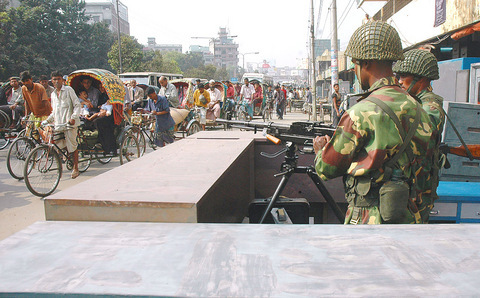In the week since the Bangladeshi president sent soldiers onto the streets to quell violent political protests, there has been an unexpected turn in public sentiment -- a growing number of people are clamoring for them to stay on and take charge.
It is an option that is still largely discussed in private -- over sweet, milky tea in the back rooms of grimy shops or over whiskey and sodas at upscale dinner parties.
But with the coming election shaping up to be the latest in a string of bloody and chaotic votes, the sentiment is there, even if the military appears unready to make such a move.

PHOTO: AP
"I know it sounds absurd, we fought so hard to end military rule. But what else can we do?" said Faruq Hossain, a 46-year-old Dhaka shop owner. "Everyone knows we're headed for a disaster."
Disasters, natural and man made, have plagued Bangladesh since independence from Pakistan in 1971 and many hoped this crowded and poor country had seen the last of its political calamities when rigidly authoritarian military rule ended in 1990.
The desire to see its return is a testament to the disaster that is Bangladeshi democracy, a violent, deeply corrupt process that centers on two women whose hatred for one another runs so deep they have not said a word to each other for years.
Khaleda Zia, who leads the Bangladesh Nationalist Party, and Sheikh Hasina Wazed, who heads the Awami League, have traded turns as prime minister since democracy was restored, with each handing out government jobs and contracts to their supporters when in power.
With few issues separating their two relatively centrist parties, elections are "all a matter of face and ego and getting to control the patronage of the state for the next five years," said a Western diplomat, who spoke on condition of anonymity because he works with both parties.
The vast majority of Bangladesh's 147 million people, meanwhile, have remained mired in grinding poverty, and there is deep frustration as the country finds itself already embroiled in another bloody election season weeks ahead of the vote, slated for Jan. 23.
At least 34 people have been killed since October in protests and street clashes between rival political camps.
Repeated nationwide strikes have brought commerce to a standstill. Hit especially hard are garment factories that are the source of countless J. Crew sweaters and Banana Republic shirts -- and more than 75 percent of Bangladesh's much-needed hard currency.
The scenario most often spelled out in conversations over the past few days with dozens of Bangladeshis is the military taking over for a limited time -- maybe a few months, no more than a few years -- to sort out the chaotic and corrupt political scene.
"The question," said Faruq Sobhan, a former foreign secretary, "is whether they will want to go once they have power."
Others say it is beside the point at this stage.
"I don't see any alternative to the army," said Nazim Kamran Chowdhury, a former lawmaker from Zia's party.
Nor do many others -- a survey of 3,301 conducted this summer found that 51 percent of Bangladeshis thought the country should be governed by the military. No margin of error was given.
"I'm sure the number has grown by now," Chowdhury said. "These two parties have ruined the country, particularly these two ladies."
The politics here are so bitter that the Constitution requires the outgoing government to step down 90 days ahead of an election and a caretaker administration to oversee the vote.
But since Zia's government stepped down in October, Hasina's former opposition has staged protests and strikes to press for changes in the administration, which it says is biased.
Many diplomats and analysts agree but see Hasina's protests as nothing more than a ploy to turn the situation in her favor. Most say it is unlikely an election can be held before the caretaker government's 90-day term expires.
Missing the deadline for a vote would prompt a constitutional crisis, and, at that point, "a military takeover would be imminent," said Mozammel Haq, a former Zia spokesman.
The problem, as Haq and others note, is that the military doesn't appear to want power.
The old guard that staged the two successful coups in 1975 and 1982 has been replaced by professionals who are more interested in lucrative UN peacekeeping missions than trying to sort out Bangladesh's crooked politics.
But that attitude could change in time of crisis.
"My family -- brothers, mother, father, sisters -- all are in Bangladesh," said a 31-year-old Lieutenant Colonel.
"We're not wealthy people. We can't afford the political problems," he said.

BRUSHED OFF: An ambassador to Australia previously said that Beijing does not see a reason to apologize for its naval exercises and military maneuvers in international areas China set off alarm bells in New Zealand when it dispatched powerful warships on unprecedented missions in the South Pacific without explanation, military documents showed. Beijing has spent years expanding its reach in the southern Pacific Ocean, courting island nations with new hospitals, freshly paved roads and generous offers of climate aid. However, these diplomatic efforts have increasingly been accompanied by more overt displays of military power. Three Chinese warships sailed the Tasman Sea between Australia and New Zealand in February, the first time such a task group had been sighted in those waters. “We have never seen vessels with this capability

A Japanese city would urge all smartphone users to limit screen time to two hours a day outside work or school under a proposed ordinance that includes no penalties. The limit — which would be recommended for all residents in Toyoake City — would not be binding and there would be no penalties incurred for higher usage, the draft ordinance showed. The proposal aims “to prevent excessive use of devices causing physical and mental health issues... including sleep problems,” Mayor Masafumi Koki said yesterday. The draft urges elementary-school students to avoid smartphones after 9pm, and junior-high students and older are advised not

Philippine President Ferdinand Marcos Jr has fired his national police chief, who gained attention for leading the separate arrests of former Philippine president Rodrigo Duterte on orders of the International Criminal Court and televangelist Apollo Carreon Quiboloy, who is on the FBI’s most-wanted list for alleged child sex trafficking. Philippine Executive Secretary Lucas Bersamin did not cite a reason for the removal of General Nicolas Torre as head of the 232,000-member national police force, a position he was appointed to by Marcos in May and which he would have held until 2027. He was replaced by another senior police general, Jose

POWER CONFLICT: The US president threatened to deploy National Guards in Baltimore. US media reports said he is also planning to station troops in Chicago US President Donald Trump on Sunday threatened to deploy National Guard troops to yet another Democratic stronghold, the Maryland city of Baltimore, as he seeks to expand his crackdown on crime and immigration. The Republican’s latest online rant about an “out of control, crime-ridden” city comes as Democratic state leaders — including Maryland Governor Wes Moore — line up to berate Trump on a high-profile political stage. Trump this month deployed the National Guard to the streets of Washington, in a widely criticized show of force the president said amounts to a federal takeover of US capital policing. The Guard began carrying